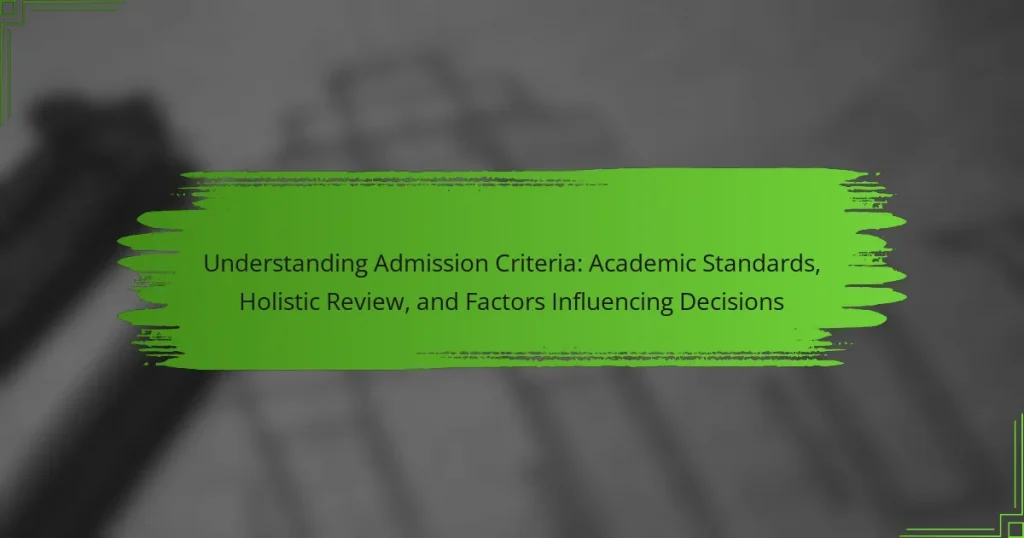
What are the key components of admission criteria?
Key components of admission criteria include academic performance, standardized test scores, letters of recommendation, and personal statements. Academic performance typically refers to high school GPA and coursework rigor. Standardized test scores often include SAT or ACT results. Letters of recommendation provide insights into a student’s character and achievements. Personal statements allow applicants to express their motivations and goals. Some institutions also consider extracurricular activities and interviews as part of their holistic review process. Each component plays a vital role in assessing an applicant’s fit for the institution.
How do academic standards influence admission decisions?
Academic standards significantly influence admission decisions by establishing the benchmarks for evaluating applicants. These standards typically include GPA, standardized test scores, and course rigor. Higher academic standards often correlate with increased competition among applicants. Institutions use these standards to assess the preparedness of students for college-level work. Research indicates that 80% of colleges consider GPA as a critical factor in admissions. Additionally, standardized tests like the SAT or ACT are used to compare applicants uniformly. Schools may also look at the difficulty of courses taken, such as Advanced Placement or International Baccalaureate classes. Ultimately, academic standards serve as a primary filter in the admissions process, shaping the applicant pool.
What specific academic qualifications are considered?
Specific academic qualifications considered include high school diplomas or equivalent certifications. These qualifications typically indicate a foundational level of education. In addition, standardized test scores such as the SAT or ACT may be evaluated. These tests provide a measure of academic readiness for college-level work. Advanced Placement (AP) or International Baccalaureate (IB) courses can also be relevant. They demonstrate a student’s ability to handle rigorous coursework. Furthermore, GPA (Grade Point Average) is a critical factor in assessing academic performance. Colleges often look for a competitive GPA within the context of the applicant’s school. Lastly, letters of recommendation and personal statements may supplement academic qualifications. They provide insight into a student’s character and potential contributions to the college community.
How do standardized test scores impact admissions?
Standardized test scores significantly impact college admissions decisions. Admissions committees often use these scores as a metric to evaluate academic readiness. High scores can enhance an applicant’s chances of acceptance. They may also influence scholarship opportunities. Many institutions consider test scores alongside GPA and extracurricular activities. Research indicates that standardized test scores correlate with college success. For example, a study by the National Center for Fair & Open Testing found that test scores predict first-year college GPA. However, some schools are moving toward a test-optional policy, emphasizing a more holistic review process.
What role does holistic review play in the admission process?
Holistic review plays a critical role in the admission process by evaluating applicants beyond academic metrics. It considers personal attributes, experiences, and potential contributions to the institution. This approach aims to create a diverse and well-rounded student body. Holistic review assesses qualities like leadership, resilience, and community involvement. Research shows that such evaluations can lead to improved student outcomes and retention rates. Institutions using holistic review often report enhanced campus diversity and inclusivity. This method aligns with a broader understanding of student success, recognizing that academic performance alone does not predict future achievement.
What factors are included in a holistic review?
A holistic review includes multiple factors that assess an applicant’s overall potential. These factors often encompass academic performance, standardized test scores, and extracurricular activities. Additionally, personal statements and letters of recommendation are critical components. Applicants’ life experiences and challenges faced are also considered. The review process evaluates the applicant’s character and contributions to the community. Institutions aim to understand the applicant’s fit within their academic environment. This comprehensive approach helps identify candidates who may excel beyond traditional metrics. Holistic reviews have been shown to create diverse and dynamic student bodies, enhancing the educational experience.
How does a holistic approach differ from traditional methods?
A holistic approach considers the whole individual rather than just specific academic metrics. Traditional methods primarily focus on quantifiable data like test scores and GPAs. Holistic review evaluates personal qualities, experiences, and potential contributions to the community. This method acknowledges that non-academic factors can significantly impact a student’s success. Research indicates that holistic admissions can lead to more diverse student bodies. A study by the National Association for College Admission Counseling found that holistic practices improve college retention rates. In contrast, traditional methods may overlook talented individuals who do not excel in standardized testing.
What external factors can influence admission decisions?
External factors that can influence admission decisions include economic conditions, demographic trends, and societal expectations. Economic conditions impact the number of applicants and available resources for institutions. For example, during economic downturns, more students may seek affordable education options. Demographic trends, such as shifts in population age or diversity, can affect applicant pools. Institutions may adjust their criteria to attract a more diverse range of candidates. Societal expectations, including the demand for certain skills or professions, can also shape admission strategies. Colleges may prioritize applicants with backgrounds in high-demand fields. These external factors collectively guide how institutions evaluate candidates and make admission decisions.
How do socioeconomic factors affect applicant evaluation?
Socioeconomic factors significantly affect applicant evaluation in admissions processes. These factors can influence the opportunities available to applicants. For instance, students from lower socioeconomic backgrounds may have less access to advanced coursework and extracurricular activities. This can lead to lower academic performance compared to their peers. Additionally, socioeconomic status can affect access to resources such as tutoring and test preparation. Research shows that admissions committees often consider these disparities. They may employ holistic review processes to account for context in evaluations. This approach aims to provide a fair assessment of each applicant’s potential. Studies indicate that socioeconomic factors can lead to biases in decision-making. Thus, understanding these influences is crucial for equitable admissions practices.
What impact do extracurricular activities have on admissions?
Extracurricular activities significantly impact college admissions. Admissions committees often consider these activities as part of a holistic review process. Participation in extracurriculars demonstrates skills such as leadership, teamwork, and time management. According to a survey by the National Association for College Admission Counseling, 70% of colleges view extracurricular involvement as a key factor in admissions decisions. Students who engage in meaningful activities can differentiate themselves from other applicants. This involvement can enhance their applications by showcasing unique interests and commitments. Additionally, strong performance in extracurriculars can indicate a well-rounded candidate. Therefore, involvement in extracurricular activities can improve a student’s chances of admission.

How do different institutions approach admission criteria?
Different institutions approach admission criteria through various methods. Some emphasize academic performance, using standardized test scores and GPA. Others adopt a holistic review process, considering personal statements and extracurricular activities. Selective institutions may prioritize unique attributes, such as leadership skills or community service. Public universities often focus on in-state residency and academic metrics. Elite schools might require interviews or portfolios to assess fit. Data shows that holistic approaches can increase diversity among admitted students. Research indicates that 45% of colleges consider non-academic factors in their admissions decisions.
What variations exist between public and private institutions?
Public institutions are funded by government sources, while private institutions rely on tuition and private donations. Public institutions generally have lower tuition rates due to state funding. Private institutions often offer smaller class sizes and more personalized attention. Admission criteria can vary significantly; public institutions may have more standardized requirements. Private institutions often use holistic review processes that consider a wider range of factors. Public institutions typically serve larger student populations, leading to diverse program offerings. Private institutions may focus on specialized programs or unique educational philosophies. These variations impact student experiences and outcomes in distinct ways.
How do admission standards differ in competitive colleges?
Admission standards vary significantly among competitive colleges. These differences often stem from academic metrics, holistic reviews, and institutional priorities. Academic standards typically include GPA, standardized test scores, and coursework rigor. Competitive colleges may require higher GPAs and SAT/ACT scores than less selective institutions. Holistic reviews consider extracurricular activities, personal statements, and letters of recommendation. This approach allows colleges to assess applicants beyond academics. Institutions may also prioritize diversity, leadership potential, or specific talents, further influencing admission standards. For example, Ivy League schools often emphasize a combination of high academic achievement and unique personal attributes.
What unique criteria do specialized institutions consider?
Specialized institutions consider unique criteria such as specific academic achievements, relevant experience, and personal attributes. Academic achievements may include advanced coursework or specialized certifications. Relevant experience often encompasses internships, research projects, or volunteer work in the field. Personal attributes can involve leadership skills, creativity, and resilience. Institutions may also evaluate fit with their mission and values. This tailored approach helps them identify candidates who align with specialized programs. For instance, a medical school may prioritize healthcare experience, while an art school might value artistic portfolios.
What trends are emerging in admission criteria across institutions?
Many institutions are shifting towards a more holistic approach in admission criteria. This trend emphasizes not just academic performance but also personal qualities and extracurricular involvement. Standardized test scores are becoming less central to the evaluation process. A report from the National Association for College Admission Counseling shows that over 1,600 colleges have adopted test-optional policies. Additionally, there is a growing focus on diversity and inclusion in admissions practices. Institutions are increasingly considering factors such as socioeconomic background and life experiences. This shift aims to create a more equitable admission process. These emerging trends reflect a broader movement towards recognizing varied student strengths and potential.
How is technology shaping the admission process?
Technology is significantly shaping the admission process by streamlining applications and enhancing data analysis. Online application platforms allow students to submit materials easily. These platforms often include features for tracking application status. Artificial intelligence is used to analyze applicant data efficiently. This analysis helps institutions identify qualified candidates based on various metrics. Additionally, virtual interviews and assessments have become more common. They provide flexibility and accessibility for both applicants and admissions teams. Data analytics tools enable schools to better understand applicant trends and demographics. This technological integration leads to more informed decision-making in admissions.
What changes are being made to adapt to diverse applicant pools?
Institutions are implementing several changes to adapt to diverse applicant pools. They are revising admission criteria to be more inclusive. This includes adopting a holistic review process. Such processes consider factors beyond standardized test scores. Institutions are also increasing outreach efforts to underrepresented communities. They are providing resources and support for applicants from diverse backgrounds. Additionally, many institutions are offering test-optional policies. Research shows that diverse applicant pools enhance the educational experience for all students. These changes aim to create a more equitable admissions landscape.

What are best practices for understanding and meeting admission criteria?
Best practices for understanding and meeting admission criteria include thorough research and careful preparation. Applicants should review the specific requirements outlined by each institution. This often includes GPA standards, standardized test scores, and prerequisite courses. Engaging with admissions counselors can provide clarity on expectations. Attending information sessions or campus tours helps to gather insights. Additionally, maintaining strong extracurricular involvement can enhance an application. Utilizing resources like college admission guides can offer further guidance. A focus on personal statements and recommendation letters is also crucial. These elements should reflect the applicant’s unique strengths and experiences.
How can applicants effectively prepare for admission requirements?
Applicants can effectively prepare for admission requirements by thoroughly researching the specific criteria set by their desired institutions. They should review academic standards, including GPA and standardized test scores. Gathering all necessary documents, such as transcripts and letters of recommendation, is essential. Applicants must also craft a compelling personal statement that reflects their unique experiences and goals. Engaging in relevant extracurricular activities can strengthen their application. Practicing for interviews can enhance their presentation skills. Understanding deadlines and submission formats is crucial for timely applications. These steps ensure applicants meet and exceed admission expectations.
What strategies can improve academic performance before applying?
Effective strategies to improve academic performance before applying include developing strong study habits and seeking help when needed. Time management is crucial; students should create a study schedule and adhere to it. Regularly reviewing material enhances retention and understanding. Engaging in active learning techniques, such as summarizing or teaching concepts, can deepen comprehension. Utilizing available resources, like tutoring centers or study groups, provides additional support. Setting specific academic goals motivates students to stay focused. Research indicates that students who actively participate in their learning experience higher academic success. Consistent practice and self-assessment can lead to improved grades and overall performance.
How can applicants enhance their holistic profile?
Applicants can enhance their holistic profile by engaging in diverse extracurricular activities. Participation in clubs, sports, or volunteer work demonstrates leadership and teamwork skills. Academic performance should be complemented by strong personal statements and recommendation letters. Showcasing unique personal experiences can differentiate an applicant. Consistent involvement in community service reflects commitment and social responsibility. Developing strong communication skills through public speaking or debate can also be beneficial. Pursuing internships or work experience provides practical skills and insights into career interests. Continuous self-improvement and reflection on personal growth are essential for a compelling holistic profile.
What resources are available to help applicants navigate admission criteria?
Universities provide various resources to help applicants navigate admission criteria. These resources include official admission websites that outline requirements. Many institutions offer online webinars that explain the application process. Admissions offices also provide one-on-one consultations for personalized guidance. Additionally, prospective students can access FAQs that address common concerns. Many universities publish detailed brochures that summarize admission criteria. Social media platforms often feature live Q&A sessions with admission counselors. Lastly, third-party educational organizations offer workshops on application strategies.
What role do counselors and advisors play in the process?
Counselors and advisors play a critical role in the admission process. They provide guidance to students on academic standards and requirements. They help students understand the holistic review process. Counselors assist in identifying strengths and weaknesses in student applications. They also offer support in selecting appropriate courses and extracurricular activities. Advisors help students prepare for standardized tests and application deadlines. Their expertise ensures students present compelling applications. Research shows that effective counseling can significantly improve admission outcomes.
How can online tools assist in understanding admission standards?
Online tools help users comprehend admission standards by providing accessible information and resources. These tools include admission calculators, which estimate eligibility based on academic performance. They also offer databases of admission requirements for various institutions. Users can access forums and discussion boards for peer insights and experiences. Additionally, webinars and online courses explain admission processes in detail. Data visualizations present trends in acceptance rates and criteria clearly. Many tools aggregate statistics on average GPAs and test scores for admitted students. This comprehensive access enables prospective students to make informed decisions about their applications.
The main entity of the article is admission criteria, which encompasses the standards and processes used by educational institutions to evaluate applicants. The article outlines key components of admission criteria, including academic performance, standardized test scores, letters of recommendation, and personal statements, while highlighting the significance of holistic review in assessing applicants’ overall potential. It also discusses the impact of socioeconomic factors, extracurricular activities, and external influences on admission decisions, as well as emerging trends in admissions practices and the role of technology. Additionally, best practices for applicants to effectively meet admission requirements and enhance their profiles are provided.




